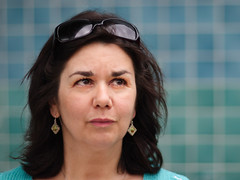But this is the way the ideas came upon me. People talked about:
- How can you know if the person really is who they say they are on the Internet? How can you know that the person who says she is a fourteen year old girl from Ohio is not a perverted 40 year old man? This is a question about malicious deceit that could actually be dangerous. Its roots are to be found in traditional fears of lurkers and paedophiles on the Internet. This issue came up twice in questions from the audience to papers about blogging and about discussion boards.
- When you are on your blog, are you showing the 'real you'? Or is this just a 'version' of the 'real you'? (This could be intentional or unintentional. It is about presentation of self in order to 'fit' with audience expectation, or what someone wants a reader to see.) This came up twice as an issue in two different papers. One was about blogging - I think it was from Sarah and one was about role play in gaming.
- When a teacher is in school and doing various activities with a class, e.g. creating a fanzine, ir creating a blog, are these 'real' fanzines? Are these 'real blogs'? (Or is this a lame, fake exercise by a teacher who cannot recreate a specific context appropriately.) This was definitely raised by one of Sarah's research subjects as mentioned in her paper on blogging in school.
Incidentally, I have also been fascinated by other accusations of fakery, or questions about authenticity in other situations too. For example, the perennial cries from Big Brother housemates are of this kind: 'She is not being genuine'; 'She is just playing to the cameras'; 'Is he for real? Is he really being himself? Or putting on a show?'
Moreover, when people dye their hair, remarks like' You can tell she dyes it' used to very insulting. Nowadays, when extreme makeovers are becoming commodity items for the rich and famous attitudes have become much more complex to interpret. However, if people are known to dye their hair from grey, this is not such a funky thing to do as dying it blue from brown, for example. So one is seen as faking it, a bit underhand; the other as a fashion statement.
So what do I think?
To take them in order:
- I feel a bit emotional about the first one. Firstly, considering the numbers of people who go on the Internet everyday, there is very little deceit or crime. Compared to real world stuff my experiences online have been overwhelmingly positive. Moreover, as Guy's work has shown, as has that of Valentine and Holloway, and many others - so many online interactions take place amongst known others from meatspace. Also it is possible to be very deceitful in meatspace of course. Pat Sikes has written about being deceived by informants in her research, for example. But the thing that makes me emotional about this, is that my daughter when she was about fourteen was in the middle of setting up a website with someone from Canada - another young girl. They had never met in 'meatspace' but had been talking online for a couple of years and had mutual online friends. One day my daughter was in tears about the fact that the Canadian girl's Mum had stopped the relationship. The mother said that she could tell my daughter was really a 'forty year old male pervert'. Yes!! So my daughter wondered what on earth it was that she said that sounded so weird and was upset that the relationship ended. That was a spin off which I had not expected, that such fears could create unpleasant events like that.
- The second point, is about identity. One if the hardest things to do I think, in any medium (Art, Drama, film, text...) is express yourself in a way which conveys what you want to say/show exactly. And there are bound to be a range of ways of interpreting of course. And who knows which you is the real you? We have multiple ways of being, so why do perfectly sensible people try to work out if you are putting on a 'front'? And if you are deliberately presenting a particular type of self, why is this more debated when it is online? We put ourselves in a fishbowllike the Big Brother people. But, whoever asked Tracy Emin if she was presenting her true self here? Is it because we seem like we are 'doing' real life, as it happens. Is it because of the presentation of the everyday stuff, but with bits missed out? Maybe it is that show/hide thing; we show more than people think we might, so then they think we are pretending to show all. There is something perhaps more nuanced, more resonant about presenting oneself online that prompts people to think around the ideas of real/not real. What is it that makes us ask these questions so often, so strongly and with such urgency? Why do we not worry about identity presentation so much in other media.
- And now the thing about blimen school. Oh dear. Schools are not real. Well, yes they are, I exaggerate. But they cannot possibly hope to recreate everything that is going on at home in the school; if it did, it would be bedlam. If teachers said to kids, 'Write what you like, it's a blog' the kids would KNOW that this offer was a fakery. They would know that the minute they wrote about sex, about how they hate their Mum/teacher/school/brother etc it would get censored. So the kids know there is a lot of pretending in school; that it is not like life outside. If we pretend that this is not so, then that is where the fakery is. I agree that this is a problem with schools; so a lot of the time, schools have to just set a few things going, in a preparatory way. So that when the kids are away from school they CAN do it properly. Schools need to prepare the kids to do stuff; it cannot all be done 'on the premises'. I am sorry about that. I don't like schools in general, but cannot berate teachers for not managing to work within a system where things are sometimes set up not to work in the same way as beyond the school gates.
Let me declare: 'These roses are photoshopped". Is that OK? The image has been treated to a bit of contrast and light adjustment ... .am I trying to hide poor photography? Or am I clever to use photoshop?
(And finally, well done if you stayed this long on my rant.)



9 comments:
Wow. I am too full of red wine and food to say much more than I agree.. especialy re the identity thing - we all present ourselves in a or more or less managed/constructed way in every situation electronic/digital or meatspace.. cf my Advent calendar, plug plug..
Wonderful wonderful stuff DrJoolz!! You and Guy and I (and others!!)should get together more often and go conferencing together again so we can come back and write about our conversations in different ways on our blogs!!!
Hi, it's Sarah Clem.
Definitely the latter, you are clever to use photoshop, they look lovely! Interesting stuff about real/not real, show/hide. I agree with what you say, that the urgency of the questions and accusations of showing only part of, or showcasing, a certain self is more pronounced with blogging and internet communication than any other. There's something so exciting and different about blogging though, that may account for why it is discussed in this way. Keeping an online diary is agreeing to open a window on your life for, potentially, anyone to look into. An unlimited and unknown audience, even if the majority of the time it is people you know, either on or off line or both, who look into it. That possibility had previously been reserved for a handful of newpaper or magazine journalists and a limited number of other people. People who usually did so as a form of paid employment and who I imagine were acutely conscious of the fact that in writing their 'column' a new self was always created, sometimes closely reflecting a, or part of a, self that friends or colleagues would readily recognise, other times not. I've forgotten what point I was making and it's probably all drivel or stuff you'd already thought about, as an expereinced blogger. Anyway, I like reading your blog.
Ok, I'm off to read Pinter's acceptance speech...
Oh this is all affirming feedback, thank you. Especially as I was thinking of deleting this - thought it too much to read. But yes I think we had much food for thought in Miami and I will run with it for a while. Sarah Clem, this is very interesting stuff you are saying. You say:
'Keeping an online diary is agreeing to open a window on your life for, potentially, anyone to look into.' and I think you are right, that this is the point. You have said this is a window and so people have an expectation that they should be able to see it all maybe. It is about displaying the minutiae and so a reader has an anticipation that they really are peeping in to a 'reality'. And that is what people used always to think of television news etc; maybe this is what it is like with all new media.
Sarah clem again,
forgot to say that the Pinter speech is about the ambiguity of language and the absence of truth in art, (in between furious criticism of American foreign policy and Tony Blair), does this have any relevance to your current thought chain?
sounds like it does ... will have to read it and thanks for the tip off. Are you around Sheffield soon?
I missed you last time you came over ..
'The presence of the original is the prerequisite of authenticity'
Walter Benjamin
I really loved reading this post.
I have been thinking alot about your daughter and the mother who stopped her daughter from communicating with her. This makes me v. v. cross.
I wonder if there was anyway of you emailing her directly and explaining how problematic her actions were?
In a way, if she knew she had mis -read the relaitonship that would be important?
or maybe it doesnt matter.
The thing I realise is that relationships do matter, even on the internet or maybe especially on the internet.
Yes, thankyou Drkate. I think the internet relationships really do matter as well. As you can imagine I wanted to intervene in someway but Rosa felt this wouldbe like your Mum going up the school. Also a big no no.
So I just had to watch in horror.
Post a Comment